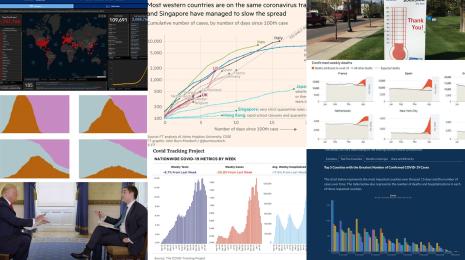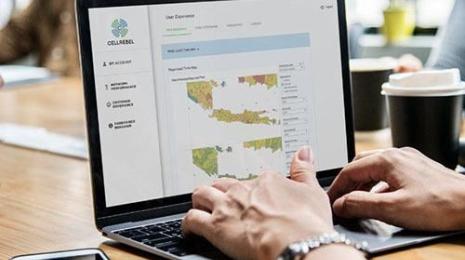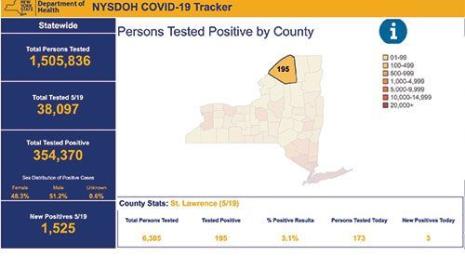Why we decided to transform one of our longstanding grant programs to respond to COVID-19

This year, business-as-usual does not apply. The COVID-19 pandemic is challenging leaders across sectors to confront a horrific crisis and adapt quickly to weather it.
As the head of Tableau Foundation, I’ve felt for myself—and heard from other leaders—an overwhelming call to action. This, in many ways, is the moment we’ve been preparing for, a time when it’s critical for leaders to step up, assess the need in their community, and find a way to respond.
The challenge that I’ve felt amid all this, and I’m sure many other leaders have also had to contend with, is twofold. There’s the issue of time—with this crisis moving so quickly, we have to be prepared to respond with similar speed. And then, there’s the magnitude of it all. How are we supposed to feel that any action we take will make enough of a difference against the scale of this problem?
Early on in the crisis, Tableau Foundation came face-to-face with these challenges as we began to think about how we might have to adapt our grantmaking strategy to respond to COVID-19. Like every organization, we had gone into this year with a set of priorities and programs in mind that were quickly facing disruption by the pandemic. Instead of trying to move ahead with business-as-usual, we knew we had to adapt.
We quickly decided that this was the moment to step up and do what we could, and not wait for the crisis to subside. We had to act with agility and empathy at the same time, while keeping true to our values of trust and collaborative problem-solving. While the actions we took were focused on grantmaking, the decision-making process we went through to get to this point can resonate across sectors as leaders everywhere are figuring out how to pivot and make quick, impactful decisions in the face of this crisis. I’m sharing how we adapted one of our longstanding programs to show that it is possible to adapt, and to effect meaningful change through decisive action.
Go with what you know is the right thing to do
Here’s what we did: For the past five years, groups of volunteers across Tableau’s global offices have gotten together to decide how to allocate funding to local organizations through our Community Grant program. Last year, we seeded a total of $275,000 across 10 of our offices, and each local volunteer committee decided how to donate the funds in their communities. The idea is that our employees in our global offices are the most engaged with what the priorities and needs of their community are, so they should be the ones with the decision-making power to manage our community grantmaking.
Normally, the Community Grant program is a 12 week process. The local volunteer committees work for several weeks during the summer to meet with local nonprofits, assess needs, and determine if the grants from Tableau Foundation could make a difference.
This year, we decided this program needed to change to respond to COVID-19. What we’ve been hearing from our nonprofit partners across the world is that they really need as much money as possible to work with in their communities–not at some future date, with strings attached, but now, with as much flexibility as possible so they can use it to address whatever is the most urgent priority in the communities they serve.
This has always been how Tableau Foundation operates—we operate our grantmaking around the idea that our partner organizations are the experts, and we trust them to use the resources we offer to the greatest effect possible. And wouldn’t it make sense that now is the time to do even more of that? Isn’t the money we have sitting aside meant to be used in situations like this pandemic—to respond to the need that’s bubbling over in nearly every community across the globe?
In talking with other grantmakers, I’ve heard that sentiment, that this is a time when we really can and should be making a difference. But I’ve also heard some reluctance to spend: what if meeting a pressing need now means being unable to do so in three months? This crisis is so widespread, so overwhelming—it’s impacting nearly every person and nearly every sector of the economy. Especially for smaller grantmakers, it can be overwhelming—how could we, with our more limited endowments, really make a difference?
Rather than caving to the noise, we decided to act in the way we felt was the right thing to do. We decided to listen to our nonprofits partners and trust what they were telling us. Instead of pulling back, we increased the budget of our annual Community Grant program by 172% from last year, and condensed the assessment period from 12 weeks to three weeks to get the money out the door as quickly as possible.
No leader can solve the entirety of this crisis. But I believe that we can all work to understand the needs we can meet, and meet them as quickly as possible. We can work incrementally, with the understanding that some funding is better than none—and that when we all decide to give, together, we’re stronger and our impact is greater than if we think of ourselves in isolation.
Let the people who understand the need take the lead
Our Community Grants program has always been driven by the idea that our employees around the world know their communities far better than we in the main office could. We have a super-engaged employee base when it comes to local giving and volunteering. The Tableau employees who step up to lead our Community Grant committees have a great familiarity with local organizations and with the particular challenges their community is facing.
When we decided to adapt the Community Grant program for a COVID-19 response, we knew that the employees who live in our Tableau communities could see firsthand how funding could have the greatest impact. We knew they should be the ones making decisions. How this played out underlined for me just how important it can be, as a funder, to get out of your own way and let need dictate where the dollars go.
When we began the process of adapting this program for COVID-19, we thought we knew what areas of need might get the most funding: necessities like food and shelter, we predicted, would be priorities, and that certainly held true. But so many of our volunteer committees decided to allocate funding toward another issue being exacerbated by the pandemic: domestic violence. As a core Tableau Foundation team, we might not have connected with the need to address this issue—there hasn’t been enough coverage of it, and it’s not an area of focus for our main grant partners. This was something that our local volunteers in several offices identified as a critical need. That’s the benefit of real trust-based philanthropy—we were able to learn from our colleagues on the ground, and were able to mobilize funding to help where we can in ways the communities needed the most.
Act quickly but thoughtfully
Especially in situations like this, there is value in taking the time to consult with communities and people on the ground to understand priorities as you go through the grantmaking process. We aren’t the only funder that does this, but each year we remind ourselves that we must take this very seriously with our Community Grants program—that’s why it normally takes months for our volunteer groups to make a final decision.
But amid this pandemic, speed in funding allocation is essential. For a lot of grantmakers, this is tough to reconcile. There’s often a sense, when making funding decisions, that speed equals recklessness. And often, it does. Rushing money into a strategic program could create issues if you don’t give yourself enough time to plan and work with your partners—and that’s something we will think about as we start to think about long-term solutions to some of the problems created or exacerbated by COVID-19.
But our Community Grants were focused on meeting immediate needs based on what we were hearing from our nonprofit partners. We understood that we were focused on alleviating suffering, not long-term strategic impact. That changed our approach.
When dedicating funding to a food bank who is now resource-strapped due to increased demand, taking three weeks versus 12 weeks to make a decision does not get us anywhere—and it creates further hardship for the grantee who must go through process for process-sake. We learned that it is important to be clear about the funding goals, and to make decisions quickly when necessary.
And remember: Now is not the time for cautious giving
There’s a difference between recklessness and swift decisiveness. In grantmaking, recklessness could look like throwing money at a program that’s likely to fail, without taking the time to calculate and assess the risk of doing so. But acting swiftly and with decisiveness could look like deciding very quickly to make a grant to an organization that you trust and whose work you know will make a difference in the community.
COVID-19 is the time for fast, decisive grantmaking—and a lot of it. I’ve heard some talk in the grantmaking space about taking an approach of “cautious giving,” or rolling back grantmaking for now until we have a clearer sense of the landscape. I would argue that we need to do more, not less and we need to lean in to and support our trusted nonprofit partners. What is the purpose of being cautious if there is so much need out there and when you know your funding is alleviating suffering?
And among smaller funders, like Tableau Foundation, there’s another element to this, which is concern that more limited grants won’t be able to do enough to chip away at this enormous need. That couldn’t be further from the truth. We learned from our employee volunteers that there was a very real impact they could make, even with a $10-$20k grant.
In Austin, the employees chose to give to an organization called Refugee Services, because they knew that their grant could directly support 20 families to access essentials like food and transit for six months. Here in Seattle, a donation of $10k to FamilyWorks, a local food bank, provided four weeks of meals to the families they’re feeding. This is far from addressing the whole scope of the consequences of COVID-19. In both cases, we’re not going to solve the hunger problem in America, but treating a grant meant to alleviate suffering with the same level of process required for a strategic grant belittles the urgency of the moment for people who are just trying to survive the week. If we are intentionally alleviating suffering, how could we then say that our money isn’t making a difference?
Finding ways to listen and respond—across every sector
Even though much of what we’ve learned through our Community Grants process this year applies to giving and philanthropy, I hope there are lessons here that leaders across sectors can incorporate into their own work. The importance of listening to the needs of the community will be incredibly crucial as more and more businesses begin to reopen. How can you keep communication channels open to ensure that you’re acting in a way that corresponds to what makes the community and your people feel safe? And if there’s an opportunity you’re hearing from your community, can you ask yourself how you or your organization might be equipped to help meet it?
At Tableau Foundation, we’re still figuring out what we can do. But through Tableau employees around the world who worked with us on it this year, we saw firsthand how powerful it can be to just start by listening and responding with what you can—even if it feels small, you can still make a difference.
Zugehörige Storys
Blog abonnieren
Rufen Sie die neuesten Tableau-Updates in Ihrem Posteingang ab.








